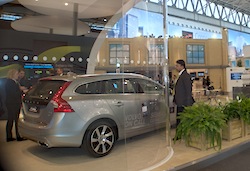Embedded SIM technology will account for 83 percent of the total revenues generated by the global connected car market over the next five years, according to new research.
Global shipments of cars with embedded mobile technology are expected to reach 36 million in 2018, with Europe accounting for 49 percent of the market.
Automotive technology consultants SBD claim that the SIM technology market will be worth €39 billion by 2018, driven in part by positive regional regulatory action in Europe, Russia and Brazil.
By helping to unleash a range of mobile-based services around safety, security, infotainment, traffic information, navigation and vehicle diagnostics, SIM technology will account for €32.6 billion of this total.
On Thursday, for example, the European Commission adopted two proposals to ensure that cars will automatically call emergency services in case of a serious crash by October 2015.
The eCall in-vehicle emergency call services mandate is expected to create sales of seven million units next year, according to the report.
“Embedding mobile technology in cars will not only save lives, but also drive a range of new services and provide a significant revenue opportunity for the mobile and automotive industries,” said Michael O’Hara, chief marketing officer of the GSMA, which published the SNB report.
Moving forward, “most, if not all” new cars will have some form of connectivity by 2025.
21 million cars fitted with smartphone integration and 10 million with tethered solutions will be shipped, according to the report.
“We are in the midst of a connected car revolution and it is vital that the mobile and automotive industries work together to deliver scalable and pervasive connected experiences and ensure this market reaches its potential,” said O’Hara.
“Not only will mobile operators play a major role in connecting all new cars by 2025, they are also well positioned to move further up the value chain and provide innovative value added services to their customers.”



